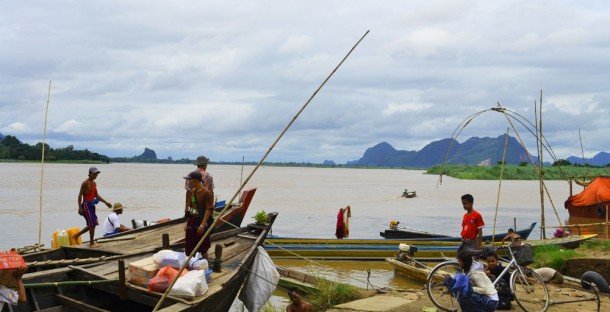RANGOON — Academics from Burma, China and Thailand gathering in Burma’s Mon State this week raised concerns about ongoing plans to build six dams on the Thanlwin River.
More than 200 researchers and university professors met at Moulmein University on Tuesday and Wednesday to share their findings on the social and environmental impacts the dams would have on communities living alongside the river. They also traveled to nearby villages to ask how local residents have been affected by dams already built upstream in China.
The academics said the livelihoods of farmers were being threatened not only by the dams, but also by the chemical industries and hydropower industries developed alongside them.
The dams upstream in China have changed the current and led to an increase of saltwater in the river and its tributaries, the academics say. The saltwater has caused erosion of soil that has, over many years, led to the disappearance of entire villages and islands in the delta of the Gulf of Martaban, while also destroying farmland, said Min Min Nwe, a coordinator for a Mon development group who helped organize the workshop at Moulmein University.
Meanwhile, waste from chemical industries has seeped into the river, harming fish and prawns while affecting the growth rate of insects and sails, which are damaging crops. “At farms along the Thanlwin River, large snails are destroying the paddy. Farmers say they are collecting carloads of snails every night,” Min Min Nwe told The Irrawaddy.
Of the six dams planned for the river, two would be in Shan State (construction has already begun on one of these), while one would be in Kayah State and three would be in Karen State.
“Once the Thanlwin river is dammed upstream, the people living downstream, like in Thanbyuzayat, Mudon and Belu Kyun [townships] and in Htone Aii [village] will see a rise in tide and deforestation, while animals like fish and birds will perish,” Min Min Nwe said. “We want to prevent that scenario.”
Academics from the workshop in Moulmein plan to submit recommendations to policymakers regarding the proposed dams.
The workshop was organized in collaboration with the Renewable Energy Association Myanmar (REAM), the Mekong Energy and Ecology Network (MEE Net), and the Towards Ecological Recovery and Regional Alliance (TERRA).

















